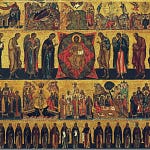At the end of one year and the beginning of the next, when it seems appropriate to look at the past and to think of the future, I came to the realization that it may be necessary to re-examine the very basis of writing in general and theological writing in particular.
Why do people write? I imagine that it used to be the case that people wrote because they had something important to say. Historically speaking, not everyone could write; of those that could, not everyone assumed that his contribution would be worth the bother. Even the greats like Plato did not always assume that; and it may be that he had to attribute his own ideas to Socrates, rather than presume that anyone would pay attention if he put his own name to them. (It helped that Socrates never wrote anything himself.)
Socrates by Bellotti Pietro, second half of the 17th century
Nowadays, however, it is very difficult to know why people write. Some appear to write because they must - whether for a class they are taking, or for a conference in which they have been asked to participate, or because they hope to get paid for their labors, or for some other such reason. Others seem to think that what they have to say is very interesting, and they have a burning desire to share with the world. Alas, it almost never is. But what if all of these reasons suddenly disappeared? Would many of us still write? Even more importantly, do many of us actually have anything to say?
Listen to this episode with a 7-day free trial
Subscribe to Phroneo to listen to this post and get 7 days of free access to the full post archives.













